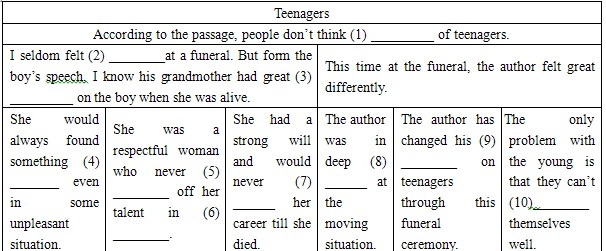
科目: 来源:专项题 题型:阅读理解

查看答案和解析>>
科目: 来源:湖南省高考真题 题型:阅读理解
查看答案和解析>>
科目: 来源:0108 期末题 题型:完形填空
| 完形填空。 | |||||
| Several pieces of advice I've gotten in my life have really made a difference. "Be 1 to people." This sounds quite common, but I'll never 2 my father telling me that. I was ten, and I had been rude to someone. He said, "There is no 3 in being rude to anyone at any time. You never know who you're going to meet later in life. 4 .you don't change anything by being rude. 5 you don't get anywhere." " 6 that you can do anything you want to do. Don't let anyone say, 'You're not 7 enough…it's too hard…it's a bad 8 …no one has done that before…girls don't do that. '"My mom gave me that advice in 1973. And it 9 me to never worry about what others were saying about my 10 direction. "Always do the 11 job you can do at whatever you're assigned, even if you think it's 12 ." Jerry Parkinson, an assistant advertising manager and my boss at P&G, told me this in 1979.Here I had just 13 from Harvard Business School(HBS), and I was assigned to determine 14 the hole in the Ivory shampoo bottle should be: 3/8 of an inch or 1/8 of an inch. I did research, focus groups...and I would come home at night 15 how I had gone from HBS to this. But later I realized that any job you're given is a(n) 16 to prove yourself. "Don't be a credit hog (吝惜赞扬的人). If you're 17 in the neighborhood of good things, good things will 18 to you." Tom Tierney, who was my boss at Bain in 1981 and is now on the eBay board, told me this. It's 19 ? you get ahead by crediting (赞扬) other people. Finally, in 1998, I was in New York 20 the big celebration as eBay went public (上市). My husband is a doctor. I called into his operating room and told him the great news. And he said, "That's nice." | |||||
|
查看答案和解析>>
科目: 来源:北京月考题 题型:阅读理解
查看答案和解析>>
科目: 来源:0103 月考题 题型:阅读理解
A. enjoys a wonderful life
B. makes a lot of money
C. faces difficulty in life
D. forgets to say "yes" in the end
查看答案和解析>>
科目: 来源:0110 期末题 题型:阅读理解
查看答案和解析>>
科目: 来源:0101 期末题 题型:阅读理解
| 任务型阅读。 请认真阅读下列短文,并根据所读内容在文章后表格中的空格里填入一个最恰当的单词。 注意:每个空格只填一个单词。 | ||||||||||||
| Teamwork is just as important in science as it is on the playing field or in the gym. Scientific investigations (调查) are almost always carried out by teams of people working together. Ideas are shared, experiences are designed, data are analyzed, and results are evaluated and shared with other investigators. Group work is necessary, and is usually more productive than working alone. Several times throughout the year you may be asked to work with one or more of your classmates. Whatever teh task your group is assigned, a few rules need to be followed to ensure a productive and successful experience. What comes first is to keep an open mind, becasue everyone's ideas deserve consideration and each group member can make his or her own contribution. Secondly, it makes a job easier to divide the group task among all group members. Choose a role on the team that is best suited to your particular strengths. Thirdly, always work together, take turns, and encourage each other by listening, clarifying, and trusting one another. Mutual support and trust often make a great difference. Activities like investigations are most effective when done by small groups. Here are some more suggestions for effective team performance during these activities: Make sure each group member understands and agrees to the task given to him or her, and everyone knows exactly when, why and what to do; take turns doing various tasks during similar and repeated activities; be aware of where other group members are and what they are doing so as to ensure safety; be responsible for your own learning, though it is by no means unwise to compare your observations with those of other group members. When there is research to be done, divide the topic into several areas, and this can explore the issue in a very detailed way. You are encouraged to keep records of the sources used each person, which helps you trace back to the origin of the problems that may happen unexpectedly. A format for exchanging information (e.g. photocopies of notes, oral discussion, etc.) is also important, for a well-chosen method not only strengthens what you present but also makes yourself easily understood. When the time comes to make a decision and take a position on an issue, allow for the contributions of each member of the group. Most important of all, it is always wise to make decisions by compromise and agreement. After you've completed a task with your team, make an evaluation of the team's effectiveness-the strengths and weaknesses, opportunities and challenges. | ||||||||||||
|
查看答案和解析>>
科目: 来源:0113 期中题 题型:阅读理解
查看答案和解析>>
科目: 来源:江西省期末题 题型:阅读理解
查看答案和解析>>
科目: 来源:同步题 题型:阅读理解
查看答案和解析>>
湖北省互联网违法和不良信息举报平台 | 网上有害信息举报专区 | 电信诈骗举报专区 | 涉历史虚无主义有害信息举报专区 | 涉企侵权举报专区
违法和不良信息举报电话:027-86699610 举报邮箱:58377363@163.com